Text
Fay World (Draft)
It took Gwen ten minutes to explain to the deputies from the San Bernadino Sheriff’s Department that the enchanted green and purple bonfire currently lighting up her parent's backyard was harmless and entirely legal under the Mythic Magic Act. As she talked and answered their questions, they nodded but their eyes remained skeptical and their hands rested on their weapons. It was the kind of uneasiness Gwen had come to expect from most humans, especially humans confronted with a large group of Mythics.
“Look why don’t you come and see for yourself?” She gestured to the house. Though it was still two hours to midnight it was as bright as dawn, the electric lights inside combining with the bonfire and the tiny magical lights hanging in the sky. The babble of voices and laughter intertwined with the distant melody of someone playing a pipe and Mythics of all shapes and sizes were scattered across the unnaturally green lawn.
“I don’t think that will be necessary. We don’t want to interrupt your party.” The junior deputy said with barely concealed apprehension. Gwen tried not to smile at how easy they were to get rid of.
“Well then if there is nothing else?” She looked between them and her eye caught on something, or rather someone, behind them. If the officers had looked they wouldn’t have noticed anything but since the age of ten, Gwen had learned to detect the slight shimmer that came when Jack, her brothers best friend, went invisible. She gritted her teeth as he flitted about the car and hoped that whatever mischief he was up to wouldn’t land them all in trouble.
She focused back on the officers as they made their goodbyes and gave the standard warning about the penalties of illegal magic. She assured them again doing her best to look relaxed. They got into their car and Gwen held her breath, waiting for Jack’s trick to manifest. When the car was halfway down the long gravel drive and nothing exploded or seemed wrong she let it out in a whoosh.
There was a chuckle beside her.
“What did you do to the car?” She asked the night air.
“Something they won’t trace back to their visit here.” She could hear the smile in his voice.
“They better not or I swear this time I will turn you in.”
“You are no fun.” Jack appeared before her, stepping into the night as if parting a curtain. Unmasked, his magic hit her; strong and unmistakably wild. Her traitorous heart skipped a beat, he was too close. She tipped her head to meet his deep green eyes.
“We have different definitions of fun”
“You used to like my tricks.” He said with a pout that didn’t fool Gwen for a second.
“That was when I was a kid and thought you and Owen were cool.” She didn’t add it was also when she’d had a ridiculous crush on him.
He gasped theatrically and placed his hand on his heart. “How dare you imply I am not cool.”
In spite of herself, Gwen smiled. “You are trouble.”
“Actually I’m a puka.”
“Same thing.”
He grinned wide enough for his dimple to flash and dipped his head as if acknowledging a compliment. His white-blonde hair looked purple in the bonfire light and Gwen tried not to notice how attractive he looked. He really was trouble. As a puka Jack was a natural born trickster and never let something as trivial as human laws get in the way of having fun. Worse he was always dragging Owen into his schemes and landing Gwen’s simple guardian faerie brother in jail.
A roar followed by laughter and cheering sounded from the bonfire.
“Looks like the dwarves have started brawling,” Gwen said.
Jack chuckled as he turned from her. “Trouble calls.” Then he stepped back into the air disappearing into the night.
Gwen shook her head, telling herself she was glad to be rid of him. Without really thinking about it she pulled out her phone to text her sister, Elaine, knowing she would understand.
Jack is the worst
Gwen stared at the screen and the five previous messages she had sent with no reply. Unlike Gwen, Elaine was hard to get a hold of and always traveling. Ostensibly she was hunting for a gateway back to the Otherworld but from her social media, it seemed the only thing she was hunting was the best photo-op. Despite her trooping faerie ways, this was the first year Elaine had missed the annual Samhain party. Gwen had been up since dawn working with her mother to accomplish what was usually a three-person job. Though working in the kitchen was vastly preferrable to making small talk with the gnomes from Arizona, Gwen couldn’t help but be resentful that her sister had left her to face the party alone.
She put her phone back in her pocket as she weaved through the various vehicles, motorbikes, pedal bikes and a school bus painted neon green that littered the driveway and front lawn. Though many guests had arrived via magic more and more Mythics were growing practical and adapting to human modes of transportation, thanks in part to the recent changes in the laws. Changes that Gwen had helped enact, not that any of them knew or cared.
The porch step creaked as she trudged to the door. If Gwen didn’t go back into the kitchen to report about the police her mother would send someone looking for her. Steeling herself she opened the door and stepping inside.
The various types of magic, overwhelming and impossible to sort out the origins, hit her like jumping naked into a glacier lake. Taking a deep breath she reminded herself that it would be easier once she adjusted to it. As she struggled to acclimate Gwen scanned the room for her mother.
She wasn’t part of the knot of pixies that were listening to Amy Takanaka. By the laughing and sly look in the kitsune’s eyes Gwen assumed she was telling about tricking her latest human boy toy. Even knowing that Mythics existed Amy still managed to fool a surprising number of men. Beyond them was Henrik, a tall, lean, Nordic elf, talking to Chetna. The naga’s snakelike eyes looked mildly interested so Gwen guessed that she didn’t yet need saving from Henrik discussing his pet wolf’s bowel movements. Scanning further over the eclectic assortment of Mythics filling the room Gwen realized her mother must be in the kitchen.
She was wondering if it would be easier to sneak outside and around the house when a frisson of magic pulled her up short. It pressed upon Gwen, making every hair stand up and her heart pound. Liquid smoke wrapped around her legs before pouring itself into the shape of a human woman in front of her.
Gwen didn’t know if all jinni had the same annoying habit of ostentatious materializing but for as long as she could remember it was how Afiya had moved even short distances. The pressure of the magic eased as Afiya took form and Gwen gave a sigh.
“If you spent more time around magic it wouldn’t affect you so strongly,” Afiya said before its mouth had fully formed.
“Nice to see you too, Auntie.” Gwen gave a sweet smile. Ignoring the advice Afiya had already given her a hundred times. Afiya was a family friend and one of the first Mythics Gwen’s parent’s had met when they came to America. Sensing its unique, powerful magic they had followed it to a cave in Death Valley. Afiya, like so many American Mythics, was a refugee and luckily had taken a liking to Branwen and Cormac despite their British origins.
Afiya wrinkled its nose, it had chosen an aristocratic one this time. “You even smell human. Our kind was never meant to spend so much time with humans.”
“So you have told me. Just as I have told you that it’s a good job, doing important work for all Mythics.”
“Your generation! The very idea of taking worthless pieces of paper and plastic instead of bartering is offensive.”
Gwen didn’t bother pointing out that Afiya’s power made it easy to disdain currency because it didn’t need it to survive. Just as it didn’t care about the Mythic laws Gwen worked on because humans couldn’t enforce them on it.
“You need to spend more time with your sister. She will teach you how to be a true guardian faerie. Where is she?”
“Not here.” Gwen couldn’t keep the sharpness from her voice.
“And you resent her for that? She is doing the work she is meant for, the most important work of all. All of this nonsense about taking orders from humans will cease when your people finally open a gateway back home.”
As it spoke Afiya began to turn smudgy at the edges and its eyes, shifted from a deep blue to an unnatural orange. Magic rolled off of it in waves and Gwen gritted her teeth to keep herself from an angry retort. With a huff, the jinni abandoned its form entirely and became a swirl of smoke that spun up to the ceiling. Gwen hoped it went out the chimney and didn’t come back so that she wouldn’t be tempted to tell it how wrong it was.
While it was true that Gwen and her family were guardian faeries and that their kind had always been the keepers of the crossroads, with abilities to both sense where doorways were possible and to open them between the worlds. It was also true that no doorway had been opened for 26 years, almost all of Gwen’s life. Afiya talked of going home but America was the only home Gwen had ever known.
Pulling out her phone she sent Elaine another message.
I almost yelled at Afiya. This is what happens when you aren’t here to run interference.
As an afterthought, she added a smiley face so Elaine wouldn’t think she was angry.
“Hey.”
Gwen looked up to see her brother Owen approaching.
“Hey.” She put her phone away.
They were of a height, his purple eyes a match to hers, but his hair was short and grass green, framing his pointed ears while hers was dyed black and shoulder length, ears safely hidden. The excess magic in the room didn’t seem to be bothering him at all as he smiled and took a bite of a honey cake that Gwen had helped make that morning. Exhaustion swept over her and she longed to grab his cake and go hide in her old bedroom.
“What did you say to Afiya?” Owen waggled his eyebrows and Gwen was sure he had a good idea of the conversation.
“I was polite. Afiya just doesn’t want to accept the truth.”
“You mean your truth that the doorways are locked forever?”
“Remind me how many doorways you have found in your ten years of looking?”
“Ouch, little sister, no need to rub it in. And to think I was going to give you a gift.” Out of the air he produced another honey cake and offered it to her with a smile. The small magic was a party trick Jack had taught them when they were younger, though Gwen had never managed to master it.
“What do you want?”
“Can’t I just do something nice?”
Gwen raised her eyebrows.
“Fine,” he said. “I got into a bit of legal trouble and I was hoping you could help me out.”
“Ow-en.” She half groaned.
“It’s not a big deal. We don’t even have to talk about it now. Just after the party before you go back to L.A.”
“Okay. After the party.” He broke into a grin and she held up her hand “But I need two more honey cakes and you have to run interference with Mom for the next hour.”
“Done.”
They didn’t shake on the bargain but Gwen knew it to be magically binding by the zing up her spine. Normally she wouldn’t make a bargain so cavalierly but Owen was her brother she trusted him not to take advantage. In quick succession, Owen produced two more cakes. Gwen took them with a smile.
“I’m going upstairs to my room,” she said.
“I will make sure you are undisturbed.”
“And tell Mom there were no issues with the police.”
He gave a mock salute before turning and plunging back into the crowd towards the kitchen. Gwen went the opposite direction to the sagging old staircase.
#
Laying in her old bed Gwen sucked the last bit of honey from her fingers. The full moon streamed through the window bathing the dark room in silver. Below and outside the party continued but at this distance the gathered magic faded into the background like hearing the pounding of waves from a beach house instead of having them break over her and drag her into the ocean.
Her families first Samhain party had been a small affair, just her parents, a nymph named Laurel they had met on their way to America, five-year-old Owen, three-year-old Gwen, and one-year-old Elaine. They had made the traditional foods and stayed up until midnight trying to catch glimpses into the world that had been suddenly closed to them. But there had been nothing to see, the Otherworld was hidden from them even on the night when the barrier between worlds was thinnest. Owen said that they sang songs and danced under stars until dawn in defiant joy but Gwen only remembered the feeling of emptiness and the desolation on her mothers face.
The next year, after her parents had made countless Mythic friends traveling the country, their small apartment had been bursting with guests and the party held a week before Samhain. Her parents had said it was to avoid upsetting their human neighbors by having so many Mythics gathered together on a day of power but Gwen was never sure that was exactly true. Especially because it seemed every year, no matter where they were living, the police were always called about the party. Gwen was wondering who had called them this year when she heard a thud from Elaine’s room.
Holding her breath she sat up and strained her ears, which were more acute than a human’s. Over the sounds of the party, she heard the faintest of footsteps and the scrape of a chair. Gwen frowned. Who could possibly have a reason to be in Elaine’s room? If it was a hobgoblin looking to do some cleaning in exchange for more food she wasn’t going to stand for it.
But when she got to Elaine's doorway the occupant wasn’t three foot and hairy nor was he cleaning. The stranger appeared to be almost six feet and was inspecting the contents of a desk drawer a red ball of faerie fire glowing above his shoulder.
Gwen switched on the electric light. The stranger reared up hitting his head on his faerie fire and cursing.
“What are you doing?” Gwen demanded as she stepped into the room.
He turned to her scowling as he rubbed the back of his head. “Was that necessary?”
“What? Who the hell are you? And why are you snooping in my sister's room?” Gwen crossed her arms trying to figure out just what kind of Mythic he was.
“Just exploring.” He flashed her a smile that would have been charming under different circumstances before continuing in a smooth accented voice, “Sorry if I scared you.”
“You didn’t scare me.” Gwen wondered if she should be scared of his magic but when she tried to feel for it all she got was the weak pulse from the faerie fire. “You’re human.”
“And you are a Mythic.” He tipped his head slightly, and a dark curl slipped onto his forehead. His face was narrow and handsome despite the slight crook in his nose.
“Why are you here?” Gwen looked at the open desk drawer. There was nothing but junk in it. Elaine didn’t really use it but this man clearly didn’t know that and his accent made it unlikely he was a local attracted by the light and noise.
“I was invited by my friend. Couldn’t pass up a chance to see a real Mythic bash.”
“What’s your friend's name?”
“John.” He barely paused but Gwen knew in her gut he was lying. She hated liars.
“No, you’re not.”
His lips twitched. “No, I’m not. Quite clever aren’t you.” He smiled and it was sharp at the edges. “Well, now that we have established that I don’t belong here shall we make a deal?”
Gwen frowned. Nothing good could come from a bargain with this man but she had finally placed his accent, some variety of British, and in spite of herself she was intrigued.
“What would be your terms?” She asked.
“I will tell you who I am, why I am here, and leave immediately if you answer one question.”
“What question?”
“First promise.”
Gwen put her hands on her hips. “I am not stupid enough to agree to anything without knowing the full terms. Especially with a human who could easily break their word.” Human’s had a choice in bargains but for her it was always magically binding. A fact she had learned painfully as a child.
“So untrustworthy.” He gave a shake of his head. “Alright. I want to know where Elaine is.”
Ice stabbed Gwen’s heart. What had Elaine gotten mixed up in now? “I will tell you what I know about where Elaine is if you tell me who you are, why you are here and leave immediately.” She hoped he hadn’t noticed her change to his wording. But his smug smile eased her fears.
“Agreed.”
“Agreed.” Gwen felt the zing up her spine sealing the bargain. “You first.”
He grinned broadly like a poker player about to lay down a winning hand. “I’m a private investigator and I am here because my employer suspects that your sister kidnapped Vivian Jamison. My job is to find Elaine and turn her into the authorities.”
“What? That’s insane. Elaine and Vivian are friends. She wouldn’t kidnap her.”
He shrugged. “And yet Vivian Jamison is missing and was last seen with your sister. Elaine’s innocence or guilt isn’t really my business. I am here to find her, turn her into the authorities and collect my money.”
Gwen was appalled by his naked avarice. This was her sister's life they were talking about. She thought of all the unanswered texts and her stomach clench in panic.
“When did Vivian go missing?”
“That wasn’t part of the agreement. Now tell me where is Elaine?” He stepped closer.
Gwen wanted to throttle him and his smug smirk, he had deliberately given her information so she would know she was selling out Elaine. She was now grateful for how little she knew.
“I don’t know where she is. The last time we spoke she was in Edinburgh.”
He glared and took another step into her space. “She was in Edinburgh five days ago. You agreed to tell me where she is now.”
“No. I agreed to tell you what I knew about where she is. That’s all I know. My end of the bargain is met.” She felt the confirming coldness wash over her. She owed this man nothing.
“But you have an idea of where she might have gone or where she might be?”
This time she stepped toward him with a sickly sweet smile. “That wasn’t part of the agreement. Now leave before I call my jinni friend up here to make you leave.”
She was close enough to see that his eyes were a deep blue as they flashed and he looked on the verge of arguing but then he broke into a laugh that took all the bravado out of Gwen. She stepped away confused.
“Well played, little fae.” He sat on the desk and eyed her speculatively “You know there is no reason for us to be enemies.”
“You are trying to get my sister pinned for kidnapping.”
“If the price was right I could be convinced to help you instead.”
“So all you care about is your payday?”
“A man’s got to eat.”
Gwen felt sick at his words. She wasn’t even sure if he was being honest or if this was just another attempt at getting information from her.
“I don’t need the help of a human bounty hunter to find my sister.”
He considered her for a long moment before nodding. Then he reached into his black motorcycle jacket and pulled out a card. “In case you change your mind.” When she didn’t move to take it he set in on the desk. He gave her one last smirk before sauntering past her and down the stairs.
She watched from the top step as he closed the front door and then went to Elaine’s window and watched him jump into an unremarkable sedan with California plates. Only when his taillights had disappeared into the dark did she move to go find Owen.
8 notes
·
View notes
Note
Most of the writing advice I've read seems to boil down to: 1) read a lot, to develop your taste, and 2) write a lot, to develop your skill. I'm solid on the first, but unlike people I think of as "real writers" (aka those people who have always known they wanted to write and started practicing as kids) I didn't start writing for fun until my twenties. Now I'm struggling to develop productive writing habits. Any tips?
Dear rkatz-rkatz,
• decide before you begin what kind of novel you are writing.
• assemble as many parts as you need to remind yourself of what this thing will be before you begin
• draft it as quickly as you can before you forget this marvelous goal
• write what the dialog is supposed to accomplish rather than fussing over perfect dialog on the first draft
• get a dog
• put all parts you need to research later in brackets [in a major city]
• remember that every novel is made in editing, not in writing. Once you have a big chunk, you can begin to chisel it into beauty.
• be stylish if you like, but remember story is king
• have fun, because otherwise, WHAT IS THE POINT
urs,
Stiefvater
2K notes
·
View notes
Text
Sometimes i think about the idea of Common as a language in fantasy settings.
On the one hand, it’s a nice convenient narrative device that doesn’t necessarily need to be explored, but if you do take a moment to think about where it came from or what it might look like, you find that there’s really only 2 possible origins.
In settings where humans speak common and only Common, while every other race has its own language and also speaks Common, the implication is rather clear: at some point in the setting’s history, humans did the imperialism thing, and while their empire has crumbled, the only reason everyone speaks Human is that way back when, they had to, and since everyone speaks it, the humans rebranded their language as Common and painted themselves as the default race in a not-so-subtle parallel of real-world whiteness.
In settings where Human and Common are separate languages, though (and I haven’t seen nearly as many of these as I’d like), Common would have developed communally between at least three or four races who needed to communicate all together. With only two races trying to communicate, no one would need to learn more than one new language, but if, say, a marketplace became a trading hub for humans, dwarves, orcs, and elves, then either any given trader would need to learn three new languages to be sure that they could talk to every potential customer, OR a pidgin could spring up around that marketplace that eventually spreads as the traders travel the world.
Drop your concept of Common meaning “english, but in middle earth” for a moment and imagine a language where everyone uses human words for produce, farming, and carpentry; dwarven words for gemstones, masonry, and construction; elven words for textiles, magic, and music; and orcish words for smithing weaponry/armor, and livestock. Imagine that it’s all tied together with a mishmash of grammatical structures where some words conjugate and others don’t, some adjectives go before the noun and some go after, and plurals and tenses vary wildly based on what you’re talking about.
Now try to tell me that’s not infinitely more interesting.
100K notes
·
View notes
Text
I am not me
but neither is she
we are each the other
the same face
the same thoughts
but separate
different
I am not me
but sometimes she is
#my writing#freeform poem#I guess#idk what this is#just a lot of feelings#to hide here on the blog#screaming into the void
2 notes
·
View notes
Photo
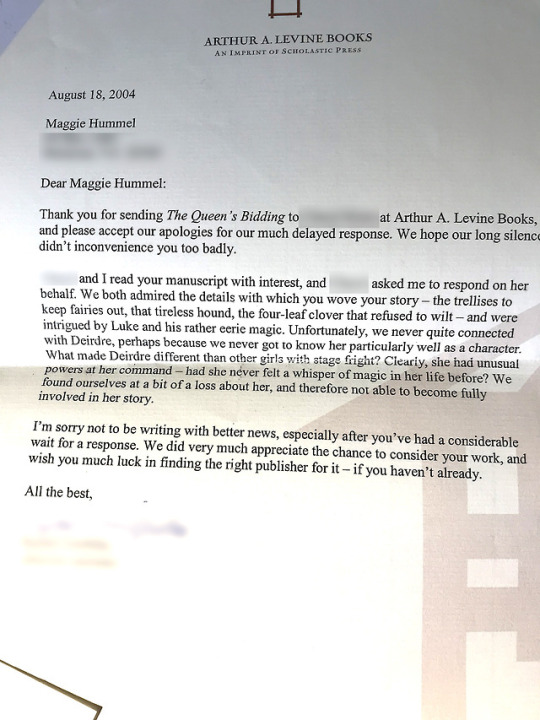
While looking for other paperwork in old drawers, I found this rejection letter from an imprint of Scholastic, my current publisher. This is for what became Lament, my first novel, published four years (and many hundreds of thousands of words of drafting and revision) later.
ETA: When I got this rejection letter, I had already been querying for this project and many, many others for nearly a decade. I had dozens of novels and hundreds of form rejections in drawers.
Rejections didn’t bother me; they were concrete proof that I was still working at it. And to get feedback? It’s how I knew I was getting close. Moreover, I NEEDED those four more years of hundreds of thousands of written words to become a writer good enough to publish.
1K notes
·
View notes
Text
Conveying Worldbuilding Without Exposition!

(As requested by both an anon and @my-words-are-light)
One of the hardest parts of writing speculative fiction is presenting readers with a world that’s interesting and different from our own in a way that’s both immersive and understandable at the same time.
Thankfully, there are a few techniques that can help you present worldbuilding information to your readers in a natural way, as well as many tricks to tweaking the presentation until it’s just right.
Four basic techniques:
1. The ignorant character.
By introducing a character who doesn’t know about the aspects of the world building you’re trying to convey, you can let the ignorant character voice the questions the reader naturally wants to ask. Traditionally, this is seen when the protagonist or (another character) is brought into a new world, society, organization. In cases where that’s the natural outcome of the plot, and the character has a purpose in the story outside of simply asking questions, it can be pulled off just fine. But there’s another aspect to this which writers don’t often consider:
Every character is your ignorant character.
In a realistic world, no person knows everything. Someone will be behind on the news. Someone won’t know all the facts. Many, many someones won’t have studied a common part of their society simply because they aren’t large part of that fraction or don’t have the time for it.
Instead of inserting an ignorant character and creating a stiff and annoying piece of expository dialogue, find the character already existing in the story who doesn’t know about the thing being learned.
2. Conflicting opinions.
A fantastic way to convey detailed world building concepts is to have characters with conflicting viewpoints discuss or argue about them. Unless you’re working with a brainwashed society, every character should hold their own set of religious, political, and social beliefs.
Examples of this kind of dialogue:
Keep reading
19K notes
·
View notes
Note
I've talked myself out of writing ideas I love because I'm too afraid of what my audience will think and that I'll be vilified for writing just about anything that isn't low-rated fluff. The fear exists for both fanfic and original fiction. Do you have any advice on how to overcome that fear?
I don’t know that it needs to be overcome so much as ignored.
Here’s the deal. (And you must all imagine me being as serious about the following as you’ve ever heard me get, even though there will be cussing in this. (In fact, as as the continuity announcers say over here, “Adult language, violence and flashing lights from the outset…”)
First of all: The hell with your audience. (…This sentiment may sound rude or potentially self-destructive, but if you run this past most professional writers who routinely do work of higher-than-phoning-it-in level, I bet you’ll get a lot of agreement.) If you’re serious about writing well, your first duty is to please yourself. You are the only audience you have any business being concerned about.
Confused people, especially people with no interest in writing anything, may attempt to shove this insight aside as somehow egotistical or selfish or silly. Ignore them. They are missing the vital data that comes of being saddled with the desire to write (and to write well; I don’t think anyone sets out on purpose to write badly, though God knows it happens).
(ETA: Wow, I got kind of intense about this, and it goes on for a bit. So here’s a cut.)
Keep reading
1K notes
·
View notes
Note
Hi Pete, Can you recommend some questions to ask during the phone call when an agent offers representation? There seems to be so much to potentially cover. I've targeted agents who seemingly have great reputations, but are there a few succinct questions that you could recommend asking? Thanks again and all the best!
There’s a pretty thorough overview on questions to ask here: http://www.victoriastrauss.com/2014/02/26/questions-to-ask-your-prospective-literary-agent/
I had an author just ask point blank (paraphrasing here): why would I sign with you as opposed to another agent – what are your strengths or what sets you apart? I really appreciated how direct the question was, and how the author asked me to explain in no unclear terms the value I bring to the table. It showed me the author (now a client) knew her own value and was taking her career as a writer seriously, not treating it like an afterthought. It’s important to remember that you are hiring someone to represent your career – this relationship will require a lot of trust – so you should feel empowered to be thorough, to follow up with emails or additional phone calls, to ask to speak to a client of the agent, to ask to speak to the agency’s relevant staff (ie, foreign rights director, any film agents if applicable, or any other important team members; you may not have to speak to these people if the agent explains their role and answers your questions to your satisfaction, but if you think it can help, you should feel comfortable asking to be in touch with them). Without meaning to diminish the rich interpersonal aspect of the author-agent relationship, this is a decision that can have an impact on your future earnings as an author. It is, in other words, a very important business decision, and it can be easy, especially if you are a debut author, to feel like you get one hour with each agent you speak to and that’s it – then you have to make the decision without bothering them again. But that’s not true, and you should make sure you have as much info as you need to make an informed decision you can be confident in.
Just off the top of my head, a few possible questions you might ask:
Editorial: What are your thoughts on the manuscript and what changes are needed before it goes on sub? How do you deliver edits? What is the timeline on delivering edits for this draft if I sign with you? How do you see this book fitting into the market?
Submissions: What is your submission strategy? Do any specific editors come to mind? What happens if it doesn’t sell the first time you send it out?
History: Who do you represent? What is your experience? How does the agency support the client?
Communication: How accessible are you? How do you prefer to communicate?
Sub rights: How are foreign and film rights to a property managed? Other subsidiary rights? (In a perfect world, your agent should have an in-house foreign rights manager, as foreign rights can be hugely important to author’s bottom line and, in an increasingly connected world, to an author’s global brand).
After submission: after a book sells, how actively do you stay involved in consulting on the publication process? How accessible are you? How do you help support an author’s brand beyond just an individual book or series? If a book doesn’t sell, will you continue to represent me for the next project?
Agency agreement: Is there an agency agreement? May I review the agency agreement prior to making a decision? What is the commission structure?
There are probably a bunch more I’m missing right now, so take a look at the link above, and good luck!
47 notes
·
View notes
Photo
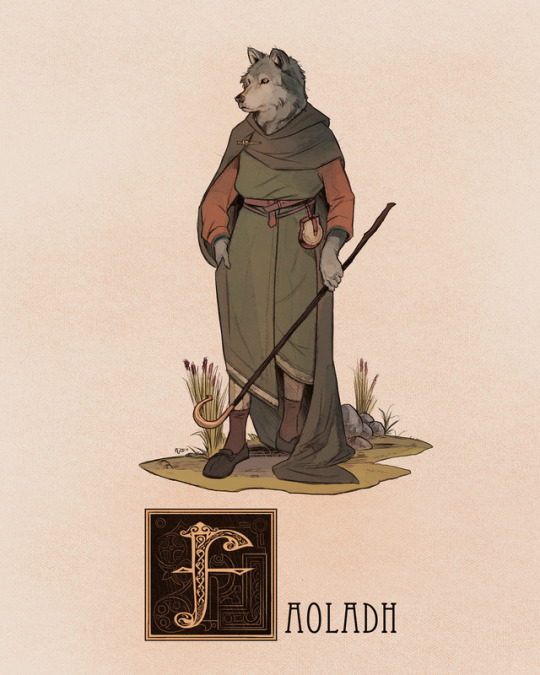
Name: Faoladh, Conroicht
Area of Origin: Ireland
The Faoladh is a non-hostile werewolf found in ancient Irish folklore, believed to protect children and stand guard over wounded men. Prior to the late 1700s when they were eradicated from the country, wolves were widely seen in Ireland, and were prominently featured in their mythology and folklore. Tales were told of saints having the power to curse men and women, turning them into wolves for certain periods of time as punishment for unjust deeds or showing signs of what they perceived as disrespect. The Faoladh are particularly prevalent in the folklore of Ossory, a medieval Irish kingdom; now present day County Kilkenny.
9K notes
·
View notes
Photo
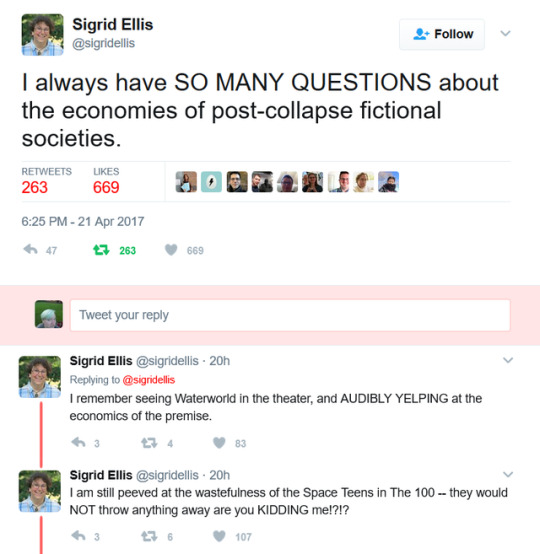
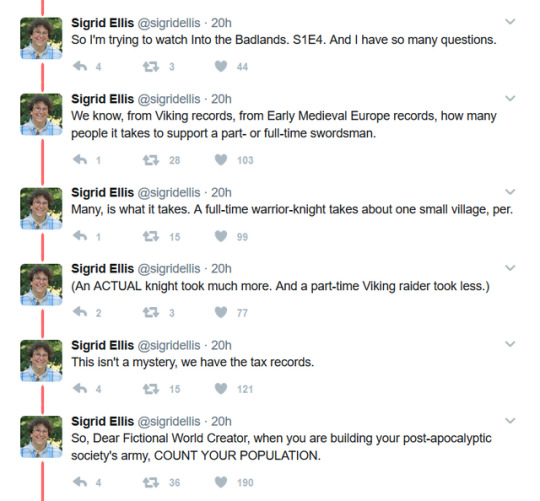

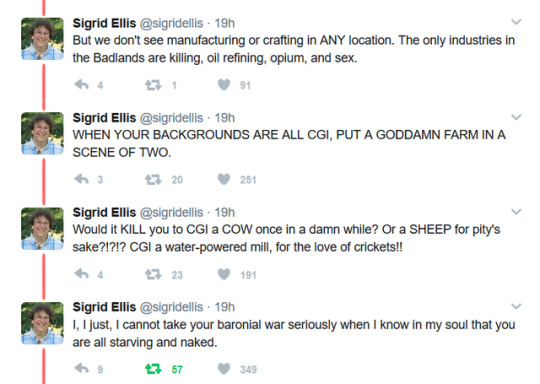
Suddenly all those Hinterlands quests to go round up a random farmer’s druffalo don’t seem so silly.
Dragon Age Inquisition - doing something right.
(source)
57K notes
·
View notes
Text
Sometimes I think we could all use a reminder that writing is extremely difficult. There are so many factors at play, always. I’ve been working at it for ten years–some of those years under the direct, loving tutelage of masters of the field–and am only now getting sort of decent at the whole thing.
Good writing requires an enormous and diverse worldly knowledge base, an enormous ability to empathize, an enormous capacity to imagine and predict human behavior, an enormous amount of reading, a high level of technical (grammatical, syntactical, etc.) skill, and an instinctive gut-sense for the musicality of language.
Basically, you’ll never write anything perfect.
No one ever has.
No one ever will.
And you know what? This is incredibly liberating. You are under NO obligation or pressure to write perfectly. Not even once.
So rub your little paws together, witch cackle, and fucking WRITE IT.
Go on. Write that thing you can’t shake off–that thing that compels you, those characters you daydream about when you’re staring out windows, the storytelling voices you’re obsessed with. Don’t let perfectionism get in your way. Don’t wait to “get good enough” to write.
There is no such thing as perfect writing. There’s not even a coherent range of writing we can draw a stable circle around and declare is almost-perfect. And if it doesn’t even almost exist, it’s not something you need to worry about achieving. Someday, or today.
21 notes
·
View notes
Photo
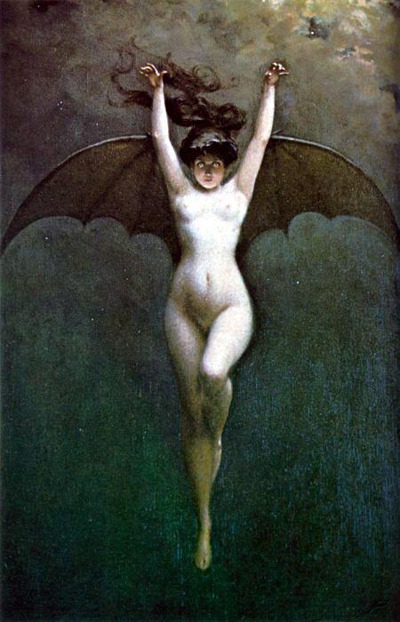
Albert Penot 1890
348 notes
·
View notes
Photo
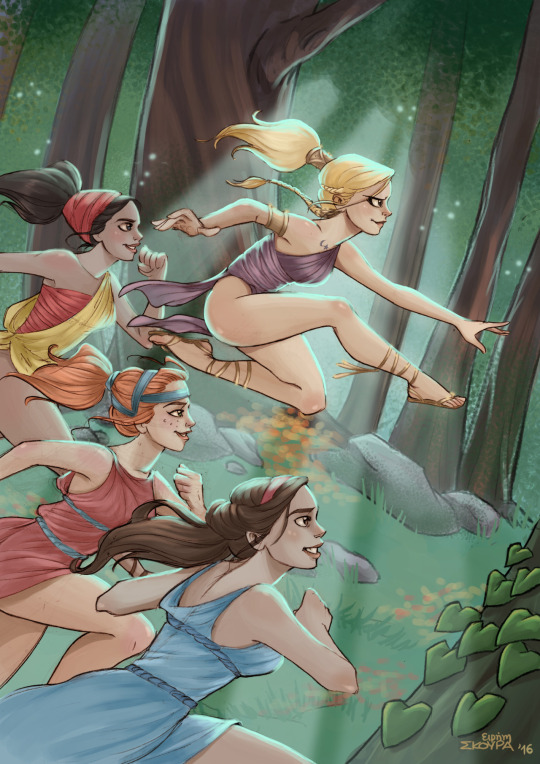
Artemis and her nymphs on a hunt
532 notes
·
View notes
Photo
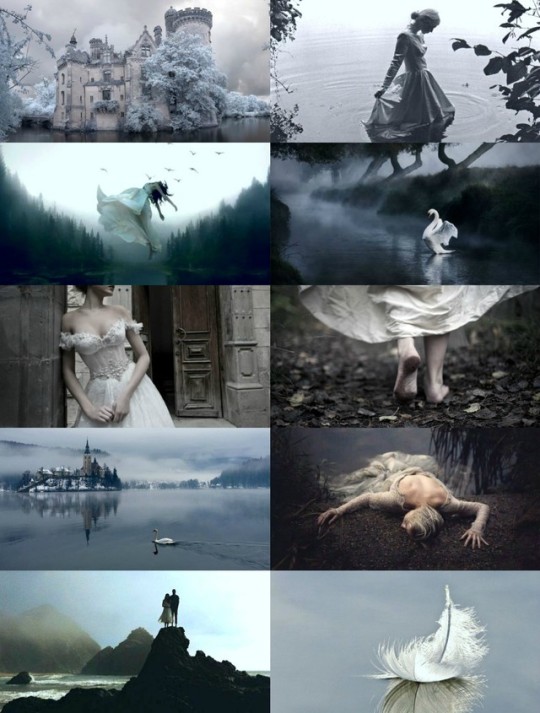
(FAIRYTALE AESTHETICS) - Swan Lake
‘Swan Lake is one of those grand, beautiful pieces. This is what you think of when you think of classical ballet. It’s a fairy tale, really, with all the great themes of good verses evil, the search for true love, treachery and deceit, and how the power of magic may be great, but it’s no match for the power of two lovers meant to be together!’. - Tyson Compton
1K notes
·
View notes
Note
Mr. Gaiman, I'm on the journey to write a lot of different things. Novels, Comics, Screenplays, and so much more. My biggest problem is that with so many projects/ideas in mind, I constantly jump from one to another because I can't decide which project is the "right" one. I worry all the time that if I finish the wrong story, no one will want to read it and I'll blow my chance as a writer. Do you have a way of knowing when it's time to write/release a story, or am I just being silly?
You aren’t being silly, but you need to start finishing things.
There is no “right” project. You have lots of bad sentences and clumsy stories, awkward comics and terrible screenplays inside you, and you get to the good ones by writing the other ones down. Imagine that each time you write “The End” a “You are now much closer to being Good” light will go on inside your head, and it will be true. Some of those stories will be bad enough you won’t want anyone ever to see them. Some of them will be wonderful. But what you are doing is learning and getting better.
There is no “wrong story”. There are just stories you should write down and finish and learn from. The thing that is most likely to “blow your chance as a writer” is not writing.
2K notes
·
View notes
Quote
Liminal space is a concept in theology and psychology. It is the intermediate, in-between, transitional state where you cannot go back to where you were because a threshold has been crossed, and you have yet to arrive where you are going because it is not yet available to you.”
(via transvelt)
9K notes
·
View notes
